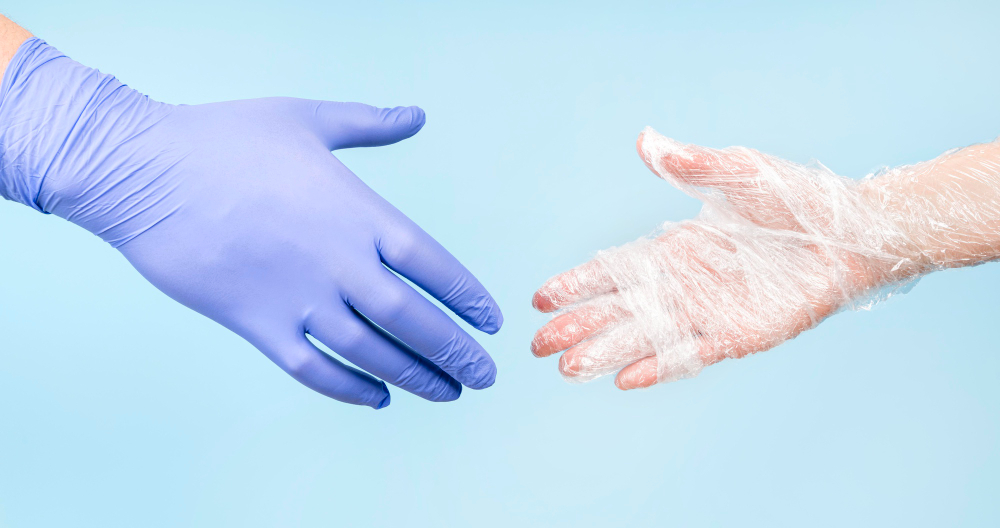Nitrile vs. Vinyl Gloves: Which Protects Best Against Viruses?

In the ongoing battle against viruses, choosing the right protective gloves is crucial. Healthcare professionals, workers in various industries, and individuals looking to protect themselves from viral infections must consider the effectiveness of different types of gloves. Two popular options are nitrile and vinyl gloves. This blog will explore the differences between these gloves, focusing on their ability to protect against viruses, and will highlight the offerings from RH Healthcare, including nitrile powder-free blue gloves, nitrile powder-free black gloves, vinyl clear powder-free gloves, and vinyl hand gloves wholesaler in Gujarat.
Understanding Nitrile Gloves
Nitrile gloves are made from a synthetic rubber known as nitrile butadiene. They are well-regarded for their durability, flexibility, and resistance to chemicals. Nitrile gloves are widely used in healthcare settings because of their superior protective qualities and are especially useful in preventing the transmission of viruses.
Nitrile powder-free blue gloves and nitrile powder-free black gloves are popular choices. These gloves are not only strong but also comfortable for extended wear. The powder-free design means there is no risk of powder residue, which can sometimes cause allergic reactions or contaminate samples in medical and laboratory settings.
Benefits of Nitrile Gloves
1. Virus Protection: Nitrile gloves provide excellent protection against viruses. They are impermeable to many infectious agents, including viruses, making them a top choice in healthcare environments where contact with blood, bodily fluids, and other potentially infectious materials is common.
2. Chemical Resistance: Nitrile gloves are resistant to a wide range of chemicals, including solvents, oils, and certain acids and bases. This makes them suitable for use in laboratories and industrial settings where chemical exposure is a concern.
3. Durability and Strength: These gloves are less likely to tear or puncture compared to latex or vinyl gloves. This durability ensures that they provide consistent protection throughout their use.
4. Hypoallergenic: Nitrile gloves are latex-free, making them a safer option for individuals with latex allergies. The powder-free versions further reduce the risk of allergic reactions.
Understanding Vinyl Gloves
Vinyl gloves are made from polyvinyl chloride (PVC) and are a cost-effective option for many applications. They are less expensive than nitrile gloves and are commonly used in settings where the risk of exposure to pathogens is low.
Vinyl clear powder-free gloves and vinyl hand gloves are available in various sizes and thicknesses. They are often used in food service, cleaning, and other light-duty tasks.
Benefits of Vinyl Gloves
1. Cost-Effective: Vinyl gloves are generally more affordable than nitrile gloves, making them a popular choice for use in settings where gloves are frequently changed, such as food service or retail.
2. Latex-Free: Like nitrile gloves, vinyl gloves are also latex-free, which reduces the risk of allergic reactions for both the wearer and those they come into contact with.
3. Suitable for Low-Risk Tasks: Vinyl gloves are adequate for tasks that do not involve high risk of exposure to infectious materials or harsh chemicals. They are often used for general-purpose activities that require a basic level of hand protection.
Nitrile vs. Vinyl Gloves: Comparing Virus Protection
When it comes to protecting against viruses, nitrile gloves are generally superior to vinyl gloves. This is due to several key factors:
1. Barrier Protection: Nitrile gloves have a higher resistance to punctures and tears, which can compromise the barrier between the wearer and infectious agents. This makes them more reliable in preventing viral transmission.
2. Tight Fit: Nitrile gloves typically provide a snugger fit than vinyl gloves, reducing the risk of pathogens entering through gaps between the glove and the skin.
3. Material Integrity: The material of nitrile gloves is more resistant to degradation from exposure to body fluids and disinfectants, maintaining their protective properties over time. Vinyl gloves, on the other hand, can be more prone to degradation, especially when exposed to fats and oils.
4. Permeability: Nitrile gloves offer better protection against permeation by viruses and chemicals. While vinyl gloves provide some barrier, they are more permeable, especially under stress or when exposed to certain substances.
RH Healthcare: Quality Gloves for Optimal Protection
R H Healthcare provides a range of high-quality gloves designed to meet various needs. Their nitrile powder-free blue gloves and nitrile powder-free black gloves are ideal for settings that require high levels of protection against viruses and chemicals. These gloves are manufactured to rigorous standards, ensuring durability, comfort, and reliability.
For environments where the risk of exposure to pathogens is lower, vinyl clear powder-free gloves and vinyl hand gloves offer a cost-effective and versatile solution. R H Healthcare’s products are designed to provide a balance of safety, comfort, and practicality, making them a trusted choice for professionals across different industries.
Conclusion
In conclusion, when it comes to protecting against viruses, nitrile gloves offer superior protection compared to vinyl hand gloves wholesaler in Gujarat. They are more durable, less permeable, and provide a better fit, making them ideal for high-risk environments like healthcare and laboratories. Vinyl gloves, while cost-effective and useful for low-risk tasks, do not offer the same level of protection and are better suited for general-purpose use.
Choosing the right type of glove depends on the specific needs and risks associated with the task at hand. RH Healthcare offers a comprehensive range of gloves, including nitrile powder-free blue gloves, nitrile powder-free black gloves, vinyl clear powder-free gloves, and vinyl hand gloves, ensuring that you can find the appropriate gloves for any situation. Prioritizing the right protective gear is essential in maintaining safety and hygiene, especially in environments where exposure to viruses is a concern.
